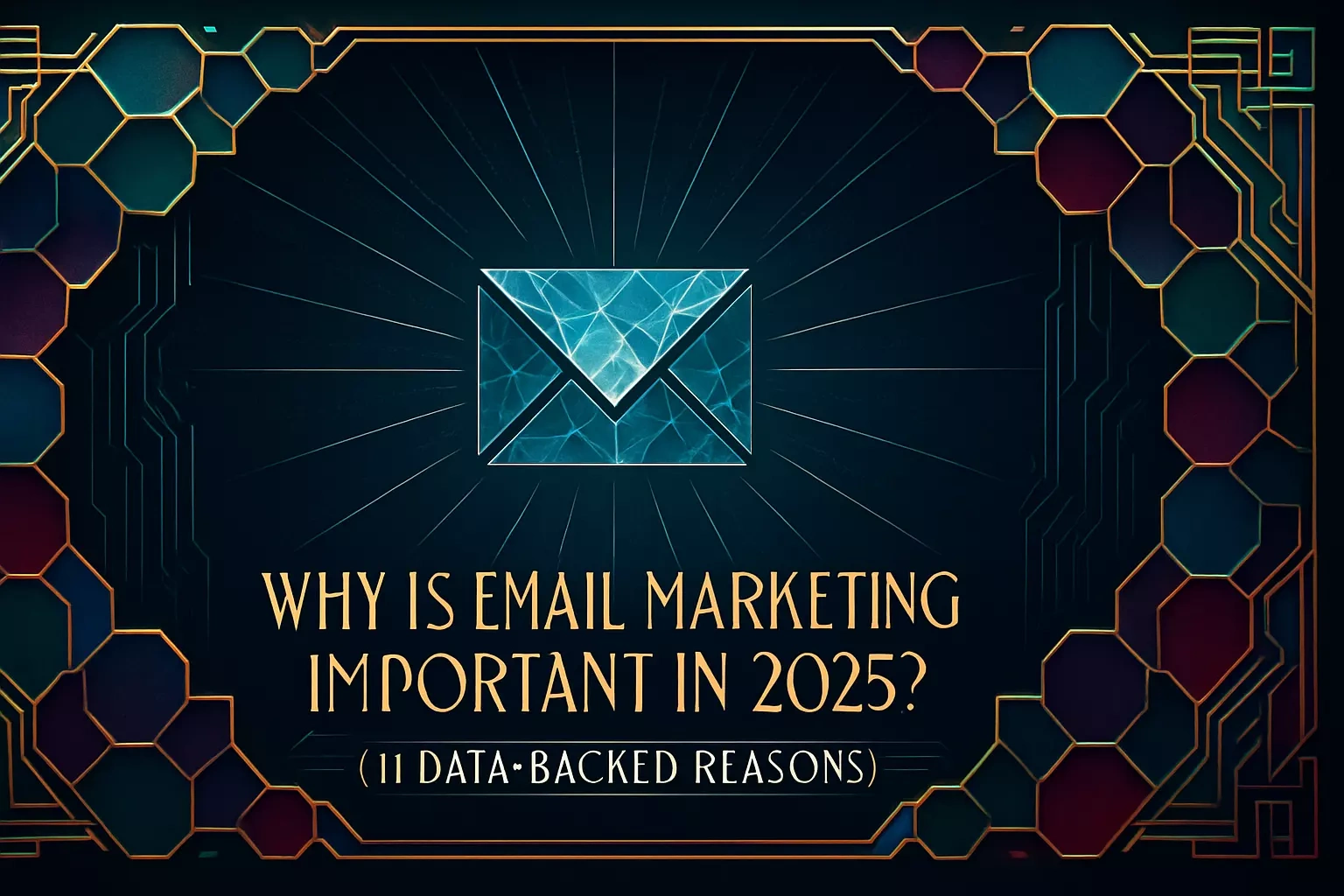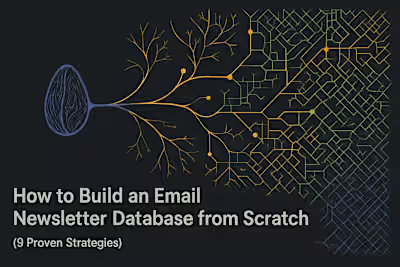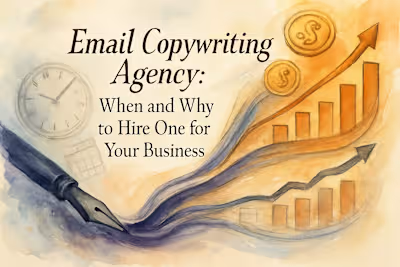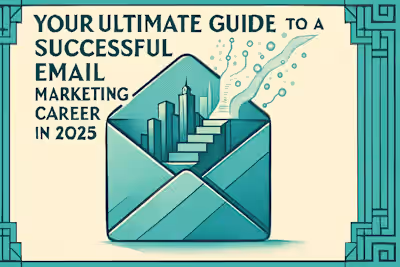Why Is Email Marketing Important in 2025? (11 Data-Backed Reasons)

Why Is Email Marketing Important in 2025? (11 Data-Backed Reasons)
Unbeatable ROI and Cost-Effectiveness
Highest Return on Investment (ROI)
Low-Cost Customer Acquisition
Direct Communication and Audience Ownership
You Own Your List
Direct and Personalized Communication
Building Customer Relationships and Loyalty
Nurturing Leads Through the Funnel
Improving Customer Retention
Enhancing the Customer Service Experience
Measurable, Versatile, and Scalable
Easily Measured and Optimized
Versatile Content Opportunities
Automation at Scale
Conclusion
References
Why Is Email Marketing Important in 2025? (11 Data-Backed Reasons)
In an age of social media and AI-powered search, some question the relevance of email marketing. However, the data tells a different story: email marketing remains one of the most effective and profitable marketing channels available. This article will explore the critical importance of email marketing in 2025. For B2B companies, this is evident in the need for professional industrial newsletter designs. Additionally, understanding the different email marketing services available can help you leverage this powerful channel effectively.
While newer marketing channels grab headlines, email quietly delivers results that other platforms can't match. It's not just about sending messages—it's about building relationships, driving sales, and creating a direct line to your audience that you actually control. Whether you're exploring fresh email marketing ideas or refining your current strategy, the numbers speak for themselves.
Unbeatable ROI and Cost-Effectiveness
Let's talk money. When it comes to getting bang for your marketing buck, email marketing sits at the top of the heap. While flashy social media campaigns and expensive TV ads grab attention, email quietly delivers profits that make CFOs smile.
Highest Return on Investment (ROI)
Here's a number that might surprise you: email marketing generates an average return of $42 for every dollar spent. That's a 4,200% ROI. Compare that to social media marketing, which typically delivers around $2.80 per dollar, or paid search at roughly $2 per dollar invested.
Why such impressive returns? Email reaches people who've already shown interest in your brand. They've given you permission to contact them. That's a warm audience ready to hear from you, not random strangers scrolling past ads.
Recent data shows that 59% of marketers say email is their biggest source of ROI. And it's not just big corporations seeing these results. Small businesses report similar success rates, with many seeing returns between $32-$45 per dollar spent.
The beauty of email ROI is its consistency. While social media algorithms change monthly and ad costs fluctuate wildly, email delivers steady returns year after year. In 2025, with rising advertising costs across other platforms, this stability becomes even more valuable.
Low-Cost Customer Acquisition
Getting new customers doesn't have to drain your budget. Email marketing proves this every day. The average cost to acquire a customer through email sits around $10-$20, depending on your industry. Compare that to:
Social media advertising: $50-$100 per customer
Google Ads: $50-$200 per customer
Traditional advertising: $150-$500 per customer
But here's where it gets really interesting. Email doesn't just acquire customers cheaply—it finds quality customers. People who sign up for your email list show genuine interest. They're not just casual browsers or impulse clickers.
Think about your own inbox. You don't hand out your email address to just anyone. When someone subscribes to your list, they're raising their hand and saying, "Yes, I want to hear from you." That's powerful.
Small businesses especially benefit from email's low costs. You don't need a massive budget to start. Many email platforms offer free plans for small lists. As you grow, costs scale reasonably. A list of 10,000 subscribers might cost $100 per month—try reaching that many people consistently through any other channel for that price.
Direct Communication and Audience Ownership
Social media platforms come and go. Algorithm changes can tank your reach overnight. But your email list? That's yours forever. This ownership advantage makes email marketing essential for long-term business success.
You Own Your List
Remember when Facebook organic reach was amazing? Businesses built huge followings, reached thousands of fans for free. Then the algorithm changed. Suddenly, you needed to pay to reach people who already liked your page.
Your email list is different. You own it completely. No algorithm decides who sees your messages. No platform can suddenly change the rules. If you have 10,000 email subscribers, you can reach all 10,000 whenever you want.
This ownership extends beyond just sending messages. Your email list is a business asset. If you sell your business, that list has real value. Try selling your social media following—you can't, because you don't own it.
Platform risks are real. We've seen social networks shut down, accounts get banned, and reach plummet without warning. But email? It's been around since the 1970s and isn't going anywhere. Your grandmother uses email. Your kids will use email. It's the most stable digital communication channel we have.
Smart businesses treat their email list like gold. They back it up regularly. They segment it carefully. They protect it fiercely. Because unlike followers or likes, an email list represents real relationships with real people who want to hear from you.
Direct and Personalized Communication
Email lets you talk to customers like individuals, not statistics. While social media broadcasts to everyone, email whispers directly to each person. This personal touch drives incredible results.
Modern email tools make personalization easy. You can address people by name, reference their past purchases, and send content based on their interests. But personalization goes deeper than just "Hi [First Name]."
You can send different messages to different segments. New subscribers get welcome series. Past customers get loyalty rewards. Cart abandoners get gentle reminders. Each person receives content relevant to their relationship with your brand.
This personal approach builds trust. When emails feel crafted just for them, people pay attention. They click more. They buy more. They stay loyal longer. Studies show personalized emails deliver 6x higher transaction rates than generic blasts.
The one-to-one feeling of email creates conversations, not broadcasts. Readers hit reply and share thoughts. They ask questions. They give feedback. Try getting that level of engagement from a Facebook post or Instagram story.
Building Customer Relationships and Loyalty
Email marketing isn't just about quick sales. It's about building relationships that last years, even decades. Smart businesses use email to turn one-time buyers into lifetime fans.
Nurturing Leads Through the Funnel
Not everyone's ready to buy immediately. Most people need time, information, and trust before opening their wallets. Email excels at providing all three.
Picture this: someone downloads your free guide. They're interested but not ready to purchase. Over the next few weeks, automated emails share helpful tips, customer success stories, and answers to common questions. By the time they're ready to buy, you're the obvious choice.
This nurturing process works because it respects the buyer's timeline. You're not pushing for immediate sales. You're providing value and building trust. When they're ready, you're there.
Effective lead nurturing sequences might include:
Welcome emails that set expectations
Educational content that solves problems
Case studies showing real results
Gentle reminders about your products
Special offers for engaged subscribers
The key is patience and value. Each email should help the reader, not just sell to them. When you focus on being helpful, sales follow naturally.
Improving Customer Retention
Getting new customers costs five times more than keeping existing ones. Yet many businesses obsess over acquisition while ignoring retention. Email marketing flips this script.
Regular communication keeps your brand visible. That monthly newsletter reminds customers you exist. Those helpful tips emails position you as the expert. Product updates show you're constantly improving.
But retention emails go beyond just staying visible. They make customers feel valued. Birthday discounts show you remember them. Loyalty rewards recognize their support. Exclusive previews make them feel special.
The numbers back this up. Businesses using email for retention see 25% higher customer lifetime values. Repeat customers spend 67% more than new ones. And retained customers become advocates, bringing in new business through referrals.
Simple retention tactics work wonders. Send a thank you email after purchases. Check in after 30 days to ensure satisfaction. Share tips for getting more from their purchase. These small touches create big loyalty.
Enhancing the Customer Service Experience
Email isn't just for marketing—it's a powerful service tool. Every transactional email is a chance to delight customers and build trust.
Think about the emails customers expect: order confirmations, shipping notifications, password resets. These aren't just functional messages. They're opportunities to reinforce your brand and exceed expectations.
Great service emails share common traits. They're clear and helpful. They anticipate questions. They provide next steps. They maintain your brand voice even in mundane updates.
Order confirmations can include care instructions or usage tips. Shipping notifications might share tracking details plus product recommendations. Support ticket updates can include helpful resources while issues get resolved.
This service excellence builds tremendous trust. When customers know they'll get clear, helpful communication at every step, they shop with confidence. They're more likely to buy again and recommend you to friends.
Measurable, Versatile, and Scalable
Email marketing gives you superpowers: the ability to measure everything, create any content type, and reach millions without breaking a sweat. These practical advantages make email essential for modern marketing.
Easily Measured and Optimized
Email marketing is a data goldmine. Every send generates numbers that reveal what's working and what's not. This measurement capability lets you improve constantly.
Key metrics tell important stories:
Open rates show if your subject lines work
Click rates reveal if content engages readers
Conversion rates prove if emails drive action
Unsubscribe rates warn when something's wrong
But measurement goes deeper than basic metrics. You can track which links get clicked most. See which products generate interest. Identify your most engaged subscribers. Learn when people prefer receiving emails.
This data drives optimization. Test subject lines to boost opens. Smart email marketers try different content formats to increase clicks. Adjust send times for maximum engagement. Every test teaches something valuable.
The feedback loop is incredibly fast. Send an email Tuesday morning, see results by lunch, implement improvements for Thursday's send. Compare that to traditional marketing where results take weeks or months to measure.
Versatile Content Opportunities
Email is like a Swiss Army knife for content. Whatever you need to share, email can handle it beautifully. This versatility makes it perfect for every marketing goal.
Newsletters keep audiences informed and engaged. Product launches build excitement and drive sales. Educational series position you as the expert. Event invitations fill seats. Survey emails gather valuable feedback.
Different formats keep things fresh:
Text-based emails feel personal and direct
HTML designs showcase products beautifully
Video emails boost engagement dramatically
Interactive emails create memorable experiences
Plain updates deliver information efficiently
You can match format to purpose. Big announcement? Go visual. Helpful tips? Keep it simple. Product showcase? Make it gorgeous. The flexibility is endless.
This versatility extends to frequency too. Daily deals sites send multiple emails per day. B2B companies might send monthly. SaaS businesses often use weekly cadences. You choose what works for your audience and goals.
Automation at Scale
Here's where email marketing gets magical. Automation lets you send perfect messages to thousands of people without lifting a finger. It's like having a tireless assistant who never sleeps.
Basic automation starts simple. Welcome series greet new subscribers. Abandoned cart emails recover lost sales. Birthday messages delight customers. These run automatically once set up.
But automation can get sophisticated. Behavioral triggers send emails based on actions. Someone views a product three times? Send a special offer. Customer hasn't purchased in 90 days? Send a win-back campaign.
The scalability is incredible. Whether you have 100 subscribers or 100,000, automation works the same. Each person gets personalized messages at the perfect time. You're not sending more emails—you're sending smarter emails.
Real businesses see amazing results. E-commerce stores recover 10-30% of abandoned carts through automated emails. SaaS companies reduce churn with automated engagement campaigns. Service businesses fill calendars with automated appointment reminders.
The best part? Once automation is set up, it runs forever. That welcome series you created last year? Still greeting new subscribers. Those abandoned cart emails? Still recovering sales. It's marketing that works while you sleep.
Conclusion
Email marketing isn't just surviving in 2025—it's thriving. The data proves what smart marketers already know: email delivers unmatched ROI, builds lasting relationships, and provides control no other channel can match.
While new platforms chase the next trend, email quietly delivers results. It reaches the right people with the right message at the right time. It builds trust through consistent value. It drives sales through smart automation.
The question isn't whether email marketing is important. The question is: can you afford to ignore it? With average returns of $42 per dollar spent, direct access to your audience, and infinite scalability, email marketing isn't optional—it's essential.
Start simple. Build your list. Send valuable content. Measure and improve. The tools are accessible, the strategies are proven, and your audience is waiting. In a world of fleeting digital trends, email marketing remains the steady foundation of online success.
Your competitors are already using email to build relationships and drive sales. Every day you wait is a day of missed opportunities. The time to start is now.
References
Like this project
Posted Jun 20, 2025
Is email marketing still effective? Absolutely. Discover 11 data-backed reasons why email marketing is more important than ever for ROI, customer relationships, and business growth.










